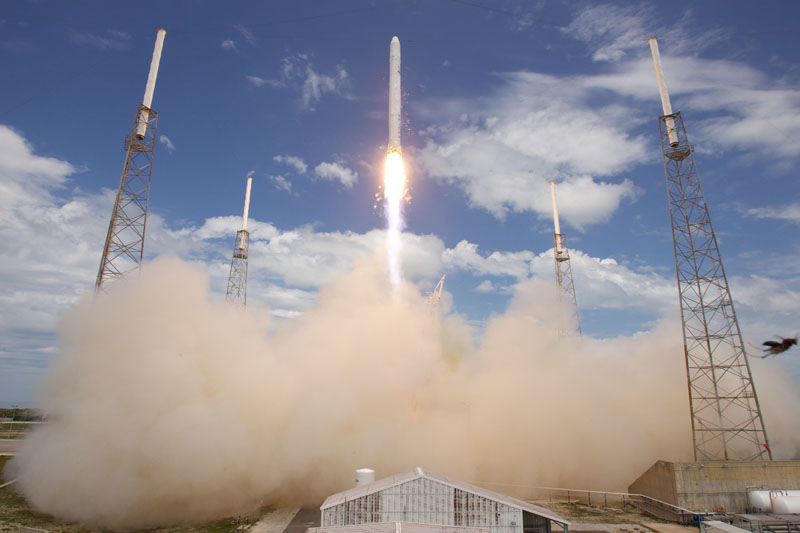Largest Commercial Rocket Launch Deal Ever Signed by SpaceX

This story was updated at 1:30 p.m. EDT.
The private rocket company SpaceX, fresh off the success ofits Falcon 9 rocket debut, has signed the largest single commercial launchcontract with satellite company Iridium Communications, Inc. ? a deal worth$492 million.
Hawthorne, Calif.-based SpaceX (Space ExplorationTechnologies) has agreed to use its Falcon9 rocket to loft Iridium's new communication satellite constellation,called Iridium NEXT, over a series of liftoffs from California's Vandenberg AirForce Base between 2015 and 2017.
"Iridium NEXT is now our largest commercial satellitelaunch customer and we are excited to play such an integral part in the mostsignificant commercial space program underway today," said SpaceX'smillionaire CEO Elon Musk, co-founder of PayPal, in a statement. "We areimpressed by Iridium's comprehensive approach and diligence in its planning asthe company prepares for the design, build and launch of Iridium NEXT."
SpaceX's Falcon 9 proved its viability as an orbital rocketon June 4 during a successful firsttest launch from Florida's Cape Canaveral Air Force Station. The rocket,with a mock-up version of the company's Dragon space capsule on top, lifted offand reached orbit as planned. [Photos:SpaceX's first Falcon 9 launch.]
SpaceX already has a $1.6 billion contract with NASA to haulcargo to the International Space Station on unmanned Dragon flights, as well asdeals to carry other commercial payloads.
Taiwan recentlyordered a launch on SpaceX's smaller Falcon 1e booster to lift itsFormosat-5 optical Earth observation satellite in late 2013 or early 2014.
Breaking space news, the latest updates on rocket launches, skywatching events and more!
"It really reinforces the fact that SpaceX and Falcon 9are the vehicle of choice of not just NASA but also for the commercialsector," Musk said of the new Iridium deal.
He called the Falcon rockets the most cost-competitivevehicles in the world, and said SpaceX is more similar to Silicon Valley techcompanies like Intel, rather than traditional aerospace companies, in terms ofits approach to innovations and cost reductions.
SpaceX has never launched a rocket from Vandenberg, but Musksaid getting the launch pad ready for the Iridium flights shouldn't be aproblem.
"We're confident we can get that done within 12-18months," he said.
SpaceX is also one of the leading contenders to take upPresident BarackObama's challenge for the private space industry to begin ferryingastronauts to low-Earth orbit and the space station after NASA's shuttle fleetretires later this year.
NASA plans to fly just two more shuttle missions, inSeptember and late November, before retiring its orbiter fleet. The spaceagency expects to use Russian Soyuz vehicles to launch astronauts untilcommercial vehicles become available.
The new contract with Iridium will add even more launches tothe growing docket for the fledgling SpaceX, which already had 24 Falcon 9flights ? including commercial and NASA launches ? scheduled before thecontract.
"We are proud to be partnered with SpaceX, and want tocongratulate Elon Musk and the entire SpaceX team on its successful inauguralFalcon 9 launch," Matt Desch, CEO of Iridium, said in a statement."Hands down, SpaceX offered us the best value coupled with an unwaveringcommitment to flawless performance and reliability. SpaceX has combined thebest of aerospace and commercial best practices to design reliable andcost-effective access to space, and Iridium will be the beneficiary of thateffort."
Iridium, based in McLean, Va., offers mobile voice and dataservices across the entire planet.
- Gallery ? Liftoff! SpaceX's Falcon 9 Rocket First Launch
- Top 10 Fantasy Spaceships Becoming Reality
- 6 Private Companies That Could Launch Humans Into Space

Clara Moskowitz is a science and space writer who joined the Space.com team in 2008 and served as Assistant Managing Editor from 2011 to 2013. Clara has a bachelor's degree in astronomy and physics from Wesleyan University, and a graduate certificate in science writing from the University of California, Santa Cruz. She covers everything from astronomy to human spaceflight and once aced a NASTAR suborbital spaceflight training program for space missions. Clara is currently Associate Editor of Scientific American. To see her latest project is, follow Clara on Twitter.
